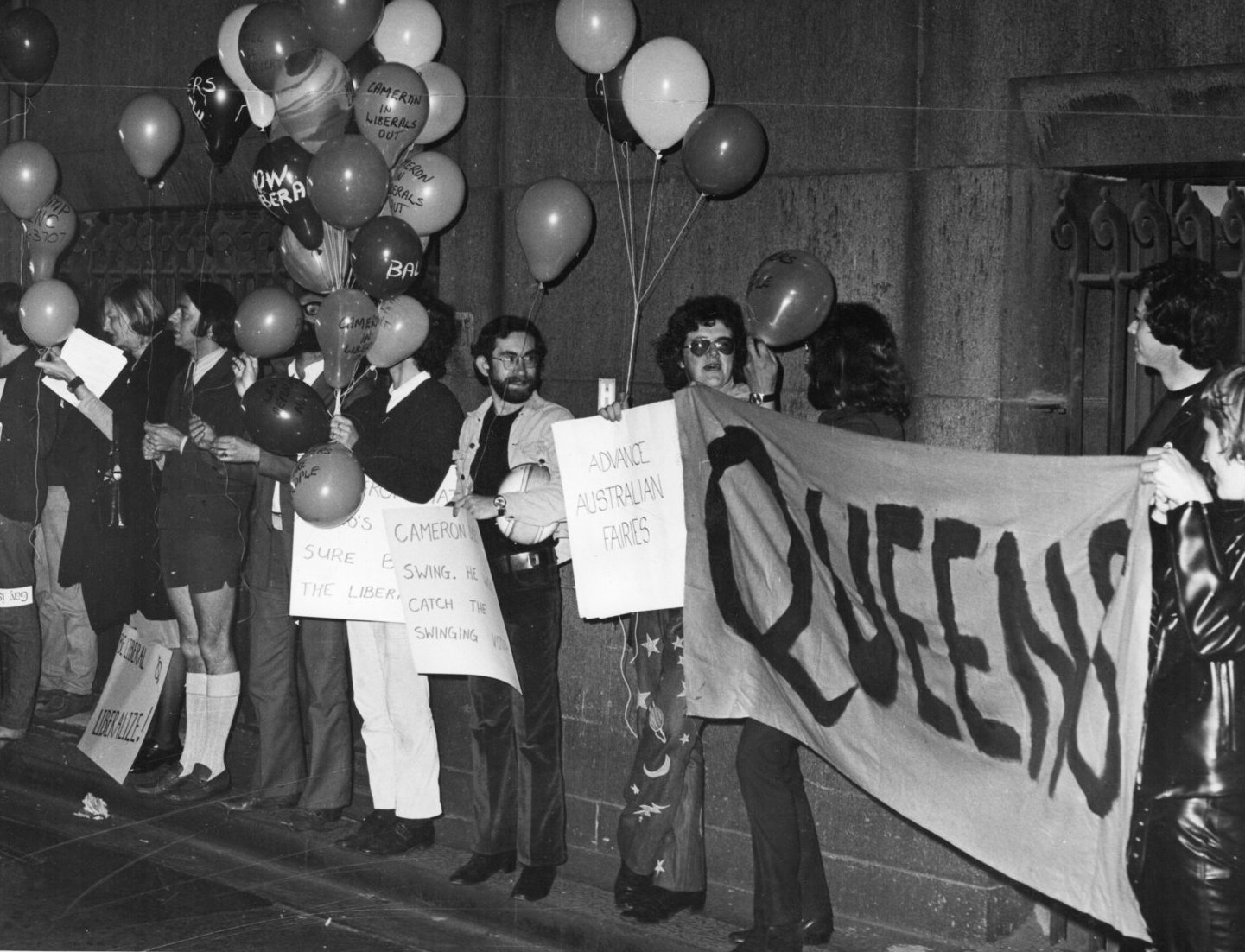
Three weeks before the march, we connected with a left-wing group of CAMP members, including Ron Austin, Lance Gowland, and Margaret and Jim Walker. They had seen the film Word Is Out, about the lives of gay people from the United States, and they liked the San Francisco Pride parade.
The CAMP members wanted to organize a nighttime street party in Sydney, starting on Oxford Street, where people could attend in costume, to avoid getting in trouble with family, school, or employers if they were recognized. They wanted it to be a nighttime festival; we talked about it as a carnival or street party. On the night and immediately after, it came to be known as Mardi Gras. We chose Oxford Street because there were several newer gay bars popular with young people who couldn’t afford other gay bars.
After the morning march, we held a forum in the afternoon to keep people engaged. And for the night protest, we decided to invite feminist and lesbian singers, including Judy Small and others. By ten o’clock, we assembled for the Mardi Gras parade at night.
It was cold, and we were standing in bloody Taylor Square outside the court — and there was no one there. We had a truck with Lance Gowland on the back and a banner I’d painted supporting gay solidarity. We sung Meg Christian’s “Ode to a Gym Teacher” and “Glad to Be Gay” by Tom Robinson. In those days, we didn’t have a lot of music to choose from.
I was wearing a country and western polka-dot dress. Only maybe ten or fifteen percent of the other people were in costumes. I didn’t know if the parade was going to be viable.
But around eleven o’clock, we had a critical mass to start the march. And we had permission from the police. We’d never done it before — so we weren’t consciously assuming that there’d be problems.
Then the police shift changed, and the Darlinghurst Police who were starting their shift viewed it as a major problem to have out-of-control gays and lesbians in the middle of the night on Oxford Street. We had only planned to march down one lane of the road. But of course, that’s not how they interpreted it. They saw it as a threat to their power, a threat to their control of the night, and a threat to their relationship with the Syndicate.
Laws called “summary offenses” gave police the power to arrest lesbians for kissing in Hyde Park, men for dancing in clubs, for having sex in toilets or for looking like they might. Those laws gave police total power over public space. So the police hurried us down Oxford Street. Instead of dancing, we were running.
Then we arrived at Hyde Park. A big anticlimax, right? We thought we’d have a bit of a dance. Anyway, the police confiscated the fucking sound truck. On top of assaulting us, they arrested Lance and others — so, spontaneously, we set out for Kings Cross, where a lot of gay bars were.
That’s when it became a march of around fifteen hundred or two thousand people — it grew as we went through Oxford Street. People peeled off the street and out of the bars to join us. The police reaction encouraged that.
When we arrived at the El Alamein Fountain, we tried to make impromptu speeches. But by then, it was midnight and people were dispersing. As they did, the police started arresting people. They mainly targeted lesbians — and then lesbians fought back. They were freeing women who had been thrown in paddy wagons and saving others from being arrested.
Once the fighting started, it wasn’t just the lesbians and gay men fighting police. People by the side of the road thought: “Here’s my chance to throw a metal garbage can lid at a policeman.” One of the reasons for this animosity was that the Darlinghurst Police had a reputation for beating and raping sex workers and other people.
Later, we went to Darlinghurst Police Station, where they held Peter Murphy and other people who had been beaten up. They wouldn’t let our lawyers or doctors in. On Sunday, we had Lee Holloway and Sue Hawke doing media for us in Glebe.
Sue was a lesbian at the time and the daughter of future prime minister Bob Hawke. By Monday, we brought four hundred or five hundred people to the Liverpool Street courthouse. The authorities closed the court illegally and made seven more arrests.

